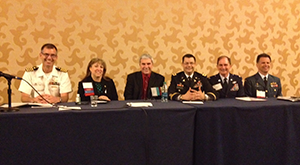Tracy Dillinger Represents NASA and Supports Human Factors at AsMA
Dr. Tracy Dillinger was selected to represent NASA this year on the Aerospace Medical Association’s (AsMA) Year in Review panel at their annual science and technology meeting. She also has been elected the Human Factors representative for the AsMA executive council. Dillinger is NASA’s manager for the Safety Culture, Human Factors in Mishap Investigations and Human Reliability Assessment programs.
Year in Review Panel

Dillinger (second from left) on AsMA Panel
The AsMA Year in Review panel takes a retrospective look at the past year’s mishap rates and trends, as well as the human performance associated with mishaps, for each represented organization. The panel has traditionally included representatives from all U.S. military service branches; this is the first year NASA has been included on the Year in Review panel.
The quality of her abstract and the strength of her presentation earned NASA a permanent slot on the AsMA Year in Review panel. Said Dillinger, “We have a lot to offer. We have robust safety prevention efforts across the agency — we can share with and learn from other organizations at the same time."
Human Factors Representative
In addition, this year Dillinger was elected as the Human Factors representative for the AsMA executive council, where she will help the council make decisions about the association’s official stance on aerospace medical community issues. She also will have the opportunity to bring Human Factors perspective and issues to the council. It is a 3-year term position.
“Human Factors is important to everyone, to all organizations,” stated Dillinger. “It is important because the human role is so critical. No matter what we do with technology, equipment or process, humans still will be the ones who are designing, maintaining and developing processes. We will always be looking at ways to evaluate and improve human performance.”
AsMA
AsMA is the largest aviation, space and environmental medicine organization in the world, with membership from industry, academia, regulatory, military and space programs from the fields of aerospace medicine, occupational medicine, psychology, human factors and science. The association has a large international constituency and it works to promote health, safety and performance of all persons involved in air, space and extreme environments. AsMA is focused on charitable, educational, scientific and advocacy endeavors.
“NASA has a vested interest in the safety, health and human performance of its astronauts and employees. In that regard the involvement with [AsMA] is directly beneficial,” stated the current AsMA President and Deputy Chief Medical Officer at NASA Kennedy Space Center, Dr. Philip Scarpa.
“We [NASA] want to be up-to-date and benefit from the research and advocacy that’s going on in the field. Policies are set in AsMA that could affect NASA, and may be just as important an influence as the research and technical advances learned.”
Scarpa estimates that 90 percent of NASA space medical specialists hold membership in AsMA.